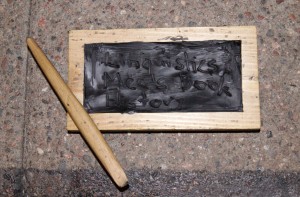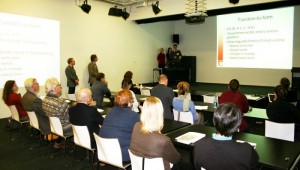Linguistics met book history on 24–25 October 2014 as twenty-odd participants gathered in the Turku Main Library for an invigorating two days of presentations and discussion on the interaction of linguistic and material issues in the study of historical text. Linguistics Meets Book History: Seeking New Approaches (aka the PoP symposium), was organised by the Department’s Pragmatics on the Page (PoP) team in association with the Turku Centre for Medieval and Early Modern Studies (TUCEMEMS).
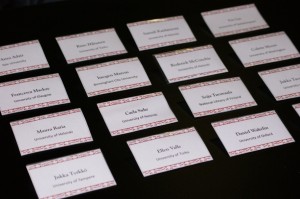
We were treated to a number of stimulating presentations on topics such as code-switching, corpus studies, script-switching, otiose and ambiguous strokes, speech markers in manuscripts, layout and organisation of the page, genre markers, and reading practices. The majority of the contributors studied late medieval to early modern material, namely manuscripts and early books, letters, inscribed artefacts and various corpora.
The three keynote speakers demonstrated a variety of approaches to combining linguistics with historical and material context. Colette Moore (University of Washington) spoke on linguistic and scribal organisation in Middle English devotional texts. Her study focused on the use of visual and textual organisation in the interpretation of historical dialogues. Jukka Tyrkkö (University of Tampere) discussed multilingualism in early printed books, concluding that code-switching correlates with bibliographical features such as format. Daniel Wakelin (University of Oxford) delivered a paper on the communicative aspects of page-framing and the patterns of ruling.
Personal highlights for the writers included, for example, Anya Adair’s presentation on ambiguous (rather than otiose) strokes in late medieval scripts; Maura Ratia’s presentation on textual labels signalling genre, text type and/or discourse form; and Daniel Wakelin’s keynote on aesthetic functions and implications of e.g. prestige carried by such practical elements as page ruling.
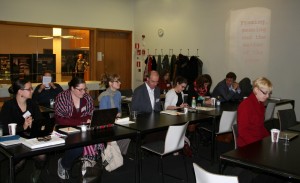
The symposium concluded in a round-table discussion on the re-introduction of philology as a terminological starting point to studies of linguistics and book history, tactics for editing historical texts, and the usefulness of collaboration between people working on different time periods. The participants unanimously agreed that the symposium had been fruitful and everyone sounded excited about the idea of #PoPsymp2.0.
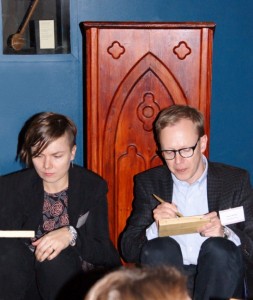
Scholars relaxing after a long day. The evening programme included a guided tour to the Aboa Vetus exhibition Letter by Letter: Traces of Reading and Writing.
Text and photos: Aino Liira, Sara Norja and Sirkku Ruokkeinen
